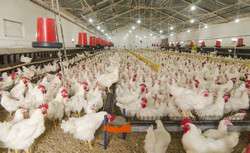Tackling tiny mites to bring major benefits to egg suppliers

For such a small creature, the poultry red mite (Dermanyssus gallinae) represents a major economic challenge for Europe's lucrative poultry and egg industry. The blood-sucking parasite, found in most European countries, can transmit fowl cholera and other diseases and is capable of devastating flocks. In fact, it is the most significant pest of laying hens in Europe.
This is why a new networking platform, designed to encourage European cooperation in chicken mite research, has been formed. This EU-funded project, called COREMI ('Improving current understanding and research for sustainable control of the poultry red mite Dermanyssus gallinae'), is part of the Cooperation in Science and Technology (COST) programme. This is Europe's longest-running intergovernmental framework for cooperation in science and technology.
COREMI, which was launched in Brussels in November 2014, currently involves members from more than 17 European countries. It addresses a key economic sector; the EU is one of the world's top producers of poultry meat and is a net exporter of poultry products. It is also the world's second largest egg producer and is a net exporter of eggs and egg products.
Efforts to improve market organisation have continuously been made since the introduction of the CAP (Common Agriculture Policy) in order to improve product quality and harmonise the market. Consumers – along with other important sectors of the food industry – rely on a steady, guaranteed supply of quality eggs.
The overarching aim of COREMI therefore is to generate a holistic approach to improve the health, welfare and productivity of the EU's 350 million laying hens through more effective prevention and control of mites. This will be achieved through cooperation and multidisciplinary networking between scientists and other stakeholders from different Member States and from different disciplines.
By consolidating existing expertise and knowledge on how mites are spread – along with their economic and social impact – it is hoped that scientists will be able to implement more efficient and sustainable control procedures.
COST, which is being funded to the tune of EUR 250 million through the EU's Seventh Framework Programme, has implemented numerous similar science and technology networks over 40 years. It achieves this through funding cooperative networks called COST Actions – such as COREMI – which foster research mobility and cooperation among nationally-funded research projects. The funding covers networking activities such as meetings (for example, travel, subsistence and local organisational support), conferences, workshops, short-term scientific exchanges, training schools, publications and dissemination activities. COST does not fund research itself.
More information: For further information, please visit: www.cost.eu/
Provided by CORDIS



















